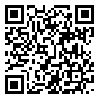1- University of Mazandaran, Babolsar, Iran , ftmh.aghajani99@gmail.com
2- University of Mazandaran, Babolsar, Iran
2- University of Mazandaran, Babolsar, Iran
Abstract: (394 Views)
The concepts of the Demiurge (the creator) and the Form of the Good occupy a central position in Plato’s metaphysics. This article examines the Demiurge’s role in shaping the material world and its relationship to the Form of the Good. Using a descriptive-analytical approach and drawing on scholarly sources, the study argues that the Demiurge is not an independent creator but rather a regulator who imposes order on pre-existing chaos by imitating the eternal realm of Forms.
Two key hypotheses are considered: first, that the Demiurge acts merely as an imitator and therefore cannot be regarded as a true creator; second, that he cannot function as the ultimate source of morality. The findings reveal that the Demiurge depends on the Form of the Good and does not create ex nihilo. This dependency introduces tensions within Plato’s broader philosophy, especially when contrasted with his negative evaluation of imitation in The Republic. Furthermore, the inconsistency between the soul’s createdness in Timaeus and its eternal, uncreated nature in Phaedrus raises doubts about the Demiurge’s role in generating the soul.
Two key hypotheses are considered: first, that the Demiurge acts merely as an imitator and therefore cannot be regarded as a true creator; second, that he cannot function as the ultimate source of morality. The findings reveal that the Demiurge depends on the Form of the Good and does not create ex nihilo. This dependency introduces tensions within Plato’s broader philosophy, especially when contrasted with his negative evaluation of imitation in The Republic. Furthermore, the inconsistency between the soul’s createdness in Timaeus and its eternal, uncreated nature in Phaedrus raises doubts about the Demiurge’s role in generating the soul.
In contrast, the Form of the Good emerges as the ultimate foundation of morality, standing above the Demiurge. Ethical values in Plato’s philosophy do not originate from the Demiurge’s activity but rather from the soul’s striving toward the Form of the Good. By redefining the Demiurge as a mediator between the Forms and the material world, this study offers a new understanding of his function as a divine regulator rather than a genuine creator. This perspective helps resolve contradictions in Plato’s metaphysical framework and deepens our understanding of the relationship between creativity, morality, and order in his thought.
Type of Study: Original Article |
Subject:
Philosophy
Send email to the article author
| Rights and permissions | |
 |
This work is licensed under a Creative Commons Attribution-NonCommercial 4.0 International License. |






